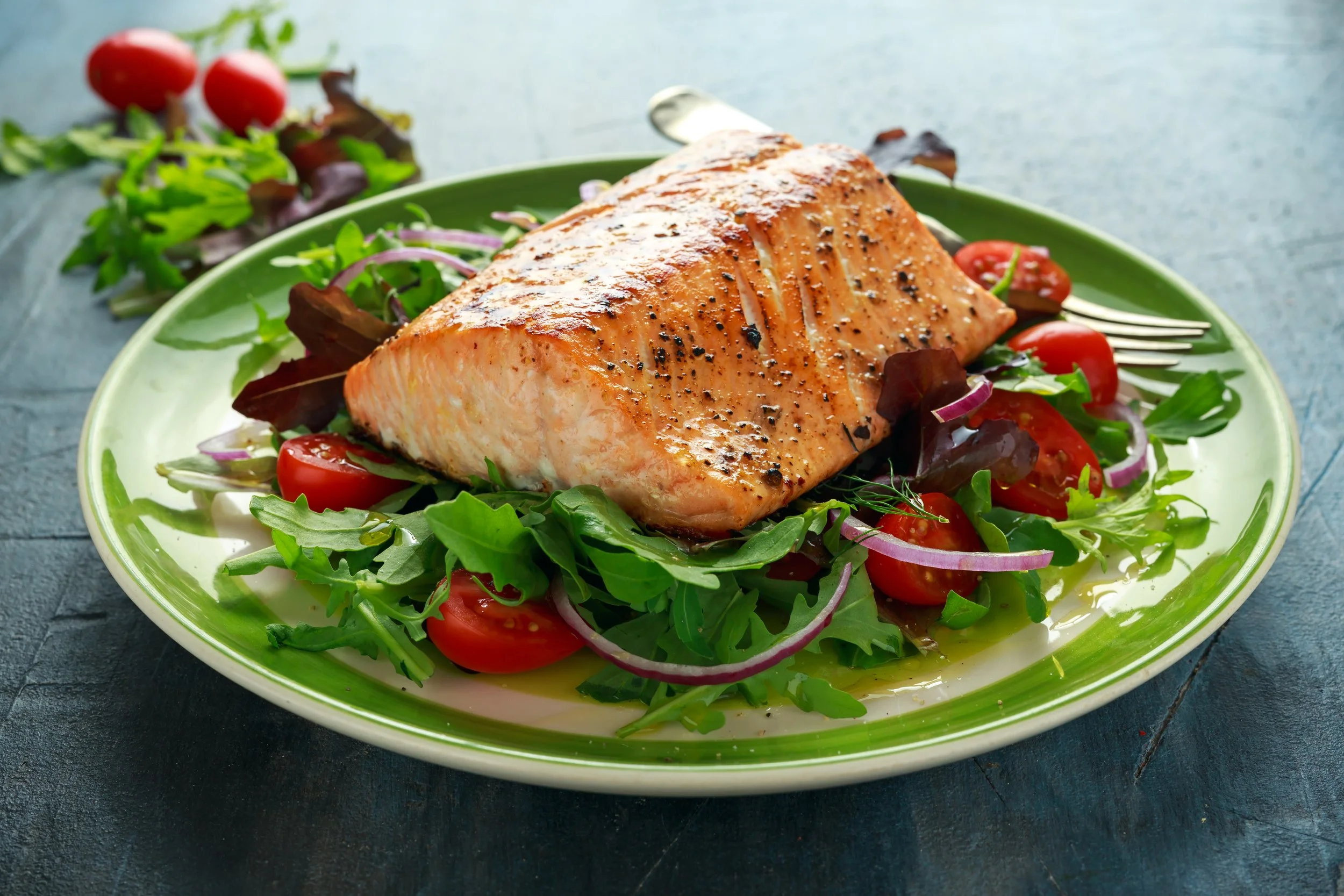Anti-Inflammatory Diet
Anti-inflammatory diets prioritise whole, unprocessed foods. This includes fruits, vegetables, whole grains, legumes, nuts, and seeds. These foods are rich in vitamins, minerals, fibre, and antioxidants, which can help combat inflammation.
Characteristics of the anti-inflammatory diet include:
Healthy fats: Incorporate healthy fats into your diet, such as those found in olive oil, avocados, fatty fish (like salmon, mackerel, and sardines), and nuts. These fats are high in omega-3 fatty acids, which have anti-inflammatory properties.
Fruits and vegetables: Aim to consume a variety of colorful fruits and vegetables. These foods are packed with phytonutrients and antioxidants that can help reduce inflammation. Berries, leafy greens, and cruciferous vegetables (such as broccoli and cauliflower) are particularly beneficial.
Herbs and spices: Include herbs and spices known for their anti-inflammatory properties, such as turmeric, ginger, garlic, and cinnamon, in your meals.
Lean protein: Choose lean sources of protein, like poultry, fish, tofu, and legumes, instead of red meat. Fatty fish, in particular, provides both protein and anti-inflammatory omega-3 fatty acids.
Whole grains: Opt for whole grains like brown rice, quinoa, and whole wheat instead of refined grains like white bread and white rice. Whole grains are rich in fiber and nutrients.
Probiotics: Incorporate foods with probiotics, such as yogurt, kefir, sauerkraut, and kimchi, into your diet. These can help support a healthy gut microbiome, which is linked to reduced inflammation.
Limit sugar and processed foods: Reduce or eliminate sugary drinks, sweets, and highly processed foods, as they can contribute to inflammation. Added sugars and trans fats are known culprits.
Moderate alcohol: If you consume alcohol, do so in moderation. Excessive alcohol intake can promote inflammation.
Hydration: Stay well-hydrated by drinking plenty of water throughout the day. Proper hydration is important for overall health, including reducing inflammation.
Potential health benefits attributed to the anti-inflammatory diet:
1. Reduced Risk of Chronic Diseases
Heart Disease: Foods rich in omega-3 fatty acids, such as fatty fish and flaxseeds, can lower levels of inflammation and reduce the risk of heart disease by improving cholesterol levels and reducing blood pressure.
Diabetes: An anti-inflammatory diet helps maintain stable blood sugar levels, reducing the risk of type 2 diabetes and improving insulin sensitivity.
Cancer: Anti-oxidant-rich foods like berries, leafy greens, and nuts help protect cells from damage and reduce the risk of certain cancers.
2. Improved Digestive Health
Gut Health: Foods like yogurt, kefir, and other probiotics support a healthy gut microbiome, reducing inflammation and improving digestion.
IBD and IBS: An anti-inflammatory diet can alleviate symptoms of inflammatory bowel disease (IBD) and irritable bowel syndrome (IBS) by reducing gut inflammation.
3. Enhanced Immune Function
Immune Response: Anti-inflammatory foods, particularly those rich in vitamins C and E, zinc, and selenium, support the immune system and help it function optimally.
Auto-Immune Conditions: Reducing inflammation can help manage auto-immune conditions like rheumatoid arthritis, lupus, and multiple sclerosis.
4. Weight Management
Healthy Weight: An anti-inflammatory diet promotes weight loss and helps maintain a healthy weight by emphasising whole foods and reducing the intake of processed foods and sugars.
Metabolism: Foods high in fibre, protein, and healthy fats boost metabolism and keep you feeling full longer, aiding in weight control.
5. Improved Mental Health
Mood and Depression: Omega-3 fatty acids, found in oily fish, walnuts, and flaxseeds, have been linked to improved mood and reduced symptoms of depression.
Cognitive Function: Anti-inflammatory foods like leafy greens, berries, and nuts support brain health and may reduce the risk of cognitive decline and Alzheimer's disease.
6. Reduced Pain and Inflammation
Joint Pain: Foods like turmeric, ginger, and omega-3-rich fish have natural anti-inflammatory properties that can help reduce joint pain and stiffness, especially in conditions like arthritis.
Chronic Pain: By lowering inflammation, this diet can help manage chronic pain conditions such as fibromyalgia and lower back pain.
7. Enhanced Skin Health
Acne and Eczema: Anti-inflammatory foods can help reduce the severity of skin conditions like acne and eczema by decreasing inflammation and supporting overall skin health.
Aging: Anti-oxidant-rich foods protect against skin damage caused by free radicals, potentially slowing the aging process and improving skin elasticity and hydration.
8. Cardiovascular Health
Blood Pressure: Consuming anti-inflammatory foods like leafy greens, berries, and whole grains can help lower blood pressure.
Cholesterol: Foods high in soluble fibre, such as oats and legumes, can help reduce bad cholesterol levels, promoting heart health.
It's worth noting that the effects of an anti-inflammatory diet can vary from person to person. It's also essential to maintain a balanced and varied diet to ensure you get all the necessary nutrients.
We encourage you to consult with a healthcare professional before making significant dietary changes, especially if you have specific health concerns or conditions. Health practitioners are qualified to provide personalised guidance based on your individual needs and medical history.
Schedule an appointment with a Naturopathic Practitioner at Optimal Vitality to discuss your health concerns and how the anti-inflammatory diet may support you on your health journey.



